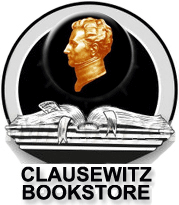
Mobile Compatible
MORE BOOKS ABOUT CLAUSEWITZ
This page is a continuation of the main Clausewitz Bookstore for books in English. See also our French, German, and UK Bookstores and our Bibliographies in several languages. Books listed on this page include older or more specialized items, but many are nonetheless important and useful. NOTE: Links on this page point to Amazon USA.
IMPORTANT RECENT WORKS — FUNDAMENTAL WORKS BY/ABOUT CLAUSEWITZ — PROBLEMATIC BOOKS
State of Doom: Bernard Brodie, the Bomb, and the Birth of the Bipolar World. By Barry Scott Zellen (Continuum, 2011). ISBN: 1441124624. This book examines Bernard Brodie's strategic and philosophical response to the nuclear age, embedding his work within the classical theories of Carl von Clausewitz. Zellen is a Researcher at the Naval Postgraduate School in Monterey, USA, where he is Research Director of the Arctic Security Project. The managing editor of Culture and Conflict Review and Strategic Insights journals, he has published several books, including On Thin Ice: The Inuit, the State and the Challenge of Arctic Sovereignty (Lexington Books, 2009) and Arctic Doom, Arctic Boom: The Geopolitics of Climate Change in the Arctic (Praeger, 2009).
Azar Gat, The Development of Military Thought: The Nineteenth Century (Oxford: The Clarendon Press, 1992). This is a useful and important book, though Gat is uncommonly pompous even for an academic and tends to take his own insights with profound seriousness. ISBN: 0198202466.
BUSINESS • Carl von Clausewitz, Clausewitz On Strategy: Inspiration and Insight from a Master Strategist. Edited by Tiha von Ghyczy, Bolko von Oetinger, and Christopher Bassford. From the Boston Consulting Group's Strategy Institute Publisher: John Wiley & Sons.
ISBN: 0471415138 "Writers who use war as a metaphor for business have always been less than appealing to me.
Maybe it's because, as some folks say, "It's a 'guy'
thing," and I'm not a guy. On the other hand, I had
trouble putting down Clausewitz on Strategy (Wiley,
2001), a publication of the Boston Consulting Group's Strategy
Institute and edited by Tiha von Ghyczy, Bolko von Oetinger,
and Christopher Bassford. In their carefully chosen selections
from Clausewitz's On War and in their lengthy commentary
in the introduction, these present-day strategists present much food for thought." (Marilyn Norris, Strategy
& Leadership
May/June 2001). • Hear audio ad •
BUSINESS • Stephen Bungay, The Art of Action: How Leaders Close the Gaps Between Plans, Actions and Results (Nicholas Brealey Publishing, 2011). ISBN-10: 1857885597 ISBN-13: 978-1857885590. We hear increasingly that "strategy" is irrelevant and that all we really need is better execution. We're pretty sympathetic to the frustrations underlying that view, but the author of The Art of Action understands that strategy and execution are not separate domains. Stephen Bungay, who enjoys real credibility as a businessman (including 17 years with The Boston Consulting Group) and as a military historian (graduate work at Oxford and Tübingen) demonstrates a sophisticated grasp both of Clausewitz and Moltke's thinking and of how that thinking was reflected in practice by the German General Staff. Crucially, and unusually for writers who attempt to map the military domain to business, he genuinely understands that "business is not war."
Philosophers of Peace and War: Kant, Clausewitz, Marx, Engels and Tolstoy, by W. B. Gallie (Cambridge: Cambridge University Press, 1978). ISBN 052129651X; 978-0521296519. From the book announcement: Intellectual eminence apart, what did Kant, Clausewitz, Marx and Engels, and Tolstoy have in common? Professor Gallie argues that they made contributions to 'international theory'—to the understanding of the character and causes of war and of the possibility of peace between nations—which were of unrivalled originality in their own times and remain of undiminished importance in ours. But these contributions have been either ignored or much misunderstood.
Modern Strategy, by Colin Gray (Oxford, 1999). ISBN: 0198782519. The late Gray was considered by many to be the foremost Clausewitzian writer on strategic affairs today.
Masters of War: Classical Strategic Thought, by Michael Handel (Cass, 3rd ed, 2001). ISBN: 0714681326. Handel's work compares the thoughts of Sun Tzu, Jomini, and Clausewitz.
War, Politics, and Power. Selections from On War, and "I Believe and Profess." By Carl von Clausewitz, translated and edited by Edward M. Collins (COL, USAF) (Chicago: Henry Regnery Company, 1962). Softcover, 209pp. ISBN: 0895264013. This is a Cold War treatment that includes a translation of Clausewitz's famous “Bekenntnisdenkschrift,” or memorandum of confession of 1812, in which he insists on “a Spanish civil war in Germany.” Clausewitz outlined a comprehensive guerrilla strategy against Napoleonic France and supported his view with theoretical reflections about the nature of defence and offence.
Clausewitz: A Biography. By Roger Parkinson (New York: Stein and Day, 1971). Reissued 2002. This book is poorly regarded by many for its poor grasp of Clausewitz's theories and for some historical errors, but it does have some strengths in covering Clausewitz's personal life and battlefield military experiences. It has been superceded by Donald Stoker's Clausewitz: His Life and Work. Softcover ISBN: 0815412339.
The Cognitive Challenge of War: Prussia, 1806. By Peter Paret (Princeton University Press, 2009). ISBN 0691135819. This book traces Napoleon's victory over Prussia in 1806 and Prussia's effort to recover from defeat to show how in one particular historical episode operational analyses together with institutional and political decisions eventually turned defeat to victory. In the concluding chapter, Paret addresses the impact of 1806 on two men who fought on opposing sides in the campaign and sought a new theoretical understanding of war—Henri Jomini and Carl von Clausewitz. Reviewed by Jennie Kiesling [USMA].
Carl von Clausewitz, Principles of War. This apears to be a reprint of the 1942 Hans Gatzke translation. Dover Books. ISBN: 0486427994. This text is free on-line HERE.
Carl von Clausewitz, The Campaign of 1812 in Russia. Trans. anonymous [Francis Egerton, Lord Ellesmere]. London: J. Murray, 1843. Foreword by Gerard Chaliand. This reprint publication, one of many, is dated 1997. Softcover, 148pp. ISBN: 0962871583. Another version of this text is available free on-line.
Reading Clausewitz. By Beatrice Heuser. Paperback - 320 pages (Pimlico, 2002) ISBN: 071266484X. This is a wide-ranging but rather shallow study—in the tradition of the "staff-college crammer"—on how to read Clausewitz and how others have read him, from the military commanders in World War One through Lenin and Mao Zedung to strategists in the nuclear age. Designed for Staff College students. See review.
Carl von Clausewitz, The Campaign of 1812 in Russia. Trans. anonymous [Francis Egerton, Lord Ellesmere]. London: J. Murray, 1843. Hardcover, 260pp. Publisher: Stackpole Books. This reprint publication 1992. ISBN: 1853671142. Another version of this text is available free on-line.
Michael Howard. Clausewitz. Oxford: Oxford University Press, 1983. Textbook Paperback, 79th ed., 79pp. ISBN: 0192876074. Sir Michael Howard has held the Chair of War Studies at King's College London, the Chichele Chair of History of War and the Regius Chair of Modern History at Oxford, and the Robert A. Lovett Chair of Military and Naval History at Yale. His works include The Franco-Prussian War, The Causes of Wars, War and the Liberal Conscience, The Lessons of History, and War in European History. Together with Professor Peter Paret he edited and translated Clausewitz, On War in 1976.
Michael I. Handel, ed. Clausewitz and Modern Strategy. London: Frank Cass, 1986. Hardcover, 324pp. ISBN: 0714632945. Softcover 0714640530. This is a useful anthology that was very influential in the 1980s. Click here for a list of its contents.
Michael Howard, Clausewitz: A Very Short Introduction (Oxford University Press, 2002), ISBN: 0192802577. Sir Michael Howard has held the Chair of War Studies at King's College London, the Chichele Chair of History of War and the Regius Chair of Modern History at Oxford, and the Robert A. Lovett Chair of Military and Naval History at Yale. His works include The Franco-Prussian War, The Causes of Wars, War and the Liberal Conscience, The Lessons of History, and War in European History. Together with Professor Peter Paret he edited and translated Clausewitz, On War in 1976. This is a convenient introduction, but it reflects a rather traditional though very positive view of Clausewitz.
Hugh Smith, On Clausewitz: A Study of Military and Political Ideas (Palgrave Macmillan, 2004). 272pp. ISBN-10: 1403935866, ISBN-13: 978-1403935861. Clausewitz is often quoted but more often misunderstood. On Clausewitz presents his central ideas about war and politics—such as war as an instrument of policy, the concept of Absolute War, friction and the fog of war—in a clear and systematic fashion. It also presents the man, his life and the military and intellectual environment in which he produced his great work On War. A final section considers Clausewitz's relevance to the rapidly changing nature of war today.

